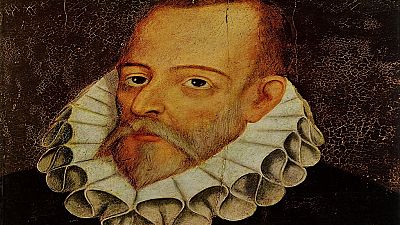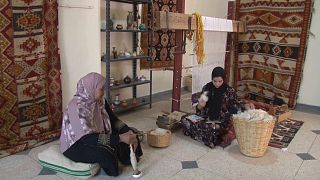Spain
The literary world is commemorating the 400th anniversary of the deaths of two of its greatest icons, British writer, William Shakespeare and his Spanish contemporary, Miguel de Cervantes.
But while Britain is paying tribute to its most famous bard in grand style, Spain is holding a rather modest celebration for the author of ‘Don Quixote’, one of the world’s best-known works of fiction.
Whereas the two authors died in the days apart in the same year (Cervantes – April 22 and Shakespeare May 3), they really had very little in common whiles alive.
Unlike Shakespeare who was a very successful author and businessman, Cervantes was never able to support himself with his writing.
Despite his book ‘Don Quixote’ becoming an instant hit, it did not make the novelist rich. Cervantes sold the rights of his work for an unknown sum to his publisher.
José Francisco Castro, a print curator said: “Miguel de Cervantes did not meet success in theatre, but after publishing Don Quixote in 1605, he achieved international fame, well beyond Madrid and Spain. A decade after the first edition, it had already been published at least six times across the Iberian Peninsula, then in Brussels, Italy, London and Paris.”
The adventures of Don Quixote de la Mancha and his squire Sancho Panza have been translated and adapted many times.
Spanish writer Andres Trapiello is the author of one of the latest modern adaptations of ‘El Quijote’.
Commenting on the importance of “Don Quixote” as a universal novel, Trapiello said: “This novel’s major significance lies in the fact that it represents the three main principles of the Enlightenment period. The three great principles of mankind, which are equality, fraternity and liberty.”
One of the highlights of Cervantes’ anniversary celebration is the new production of Don Quixote by the Spanish National Dance Company, inspired by Marius Petipa and Alexander Gorski’s 1869 version.
The ballet is currently touring Spain with stops in Valencia, Bilbao and Granada.
Euronews














02:18
New York research centre celebrates 100 years of documenting Black culture
02:01
Kenyan literary giant Ngũgĩ wa Thiong'o mourned as a cultural icon
01:49
Kenyans pay tribute to revered author Ngũgĩ wa Thiong'o
01:07
Oliver Laxe returns to Cannes with mystical drama "Sirât"
01:07
Barcelona clinches 28th league title as Lamine Yamal shines in Derby victory
00:52
Barcelona stuns Madrid in title race